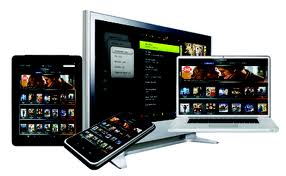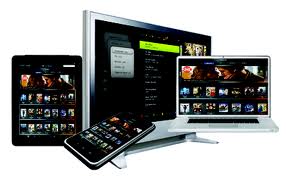 Up until recently, it was thought that in this climate of multiple screen size, form factor and price devices, people would be buying different devices for different purposes, and it would be a multi-screen environment. For example, people would have a desktop computer at home, a smartphone for mobile purposes, and a tablet or a laptop for mobile computing, mp3 players for listening to music and so on.
Up until recently, it was thought that in this climate of multiple screen size, form factor and price devices, people would be buying different devices for different purposes, and it would be a multi-screen environment. For example, people would have a desktop computer at home, a smartphone for mobile purposes, and a tablet or a laptop for mobile computing, mp3 players for listening to music and so on.
The abundance of tablets, phablets (oversized phones which can be counted as tablets), smartphones in this year’s CES may have given one the idea that that might not be the case and bigger form factors like desktop computers might have been on the decline. But still, one could say that this could be due to the popularity of tablets and smartphones as a new technological frontier, the high profit margins and the enthusiasm of every manufacturer to jump on the bandwagon.
But the analysts at analytics company Gartner think otherwise – their analysis on the recent computer shipments says that pc shipments are in real decline. 90.3 million pcs were shipped in the last 3 months of 2012, with a 4.9% decline over 2011’s last 3 months.
Gartner analyists base this on the rationale that PC users have not been replacing their older pcs as tablets became accessible, and shifted their consumption to tablets instead. Their future prediction keeps this trend, and says that people will be shifting their consumption more to tablets, and will be using shared pcs for common tasks that may not be done on tablets. In addition, computers which were closer to tablet form factor were feeling the pressure more, according to gartner, with laptops and netbooks going down in sales around 11%.
This quite may be true in that tablets are readily powerful enough to take care of most consumption computing usage like watching high quality videos, listening to music, web surfing and generic internet usage – which constitute most of the usage for majority of the population. Inevitably, due to ergonomy and convenience issues, it is impossible to accomplish any real work-related task (apart from communication and mailing) on tablets, and they definitely are not (and cannot) be powerful enough as high end gaming pcs to do high end gaming – but these tasks do not constitute the majority of common computing.
In another angle, some are blaming the fall of pc sales due to Windows 8 : Not only microsoft failed to do a good launch of Windows 8 with appropriate fanfare and marketing, but also Windows 8 is a very drastic change from Windows 7, and it will take some time for users to be able to get comfortable with it and trust it enough to start buying pcs with Windows 8. This naturally marks a very tough spot for PC manufacturers which preload Windows 8 to their products.
Though still, ‘death of pc’ and ‘rise of tablets’ have been a buzz which was generated over and over again in the past 5-6 years, and it has not come true at all. Moreover, impossibility of accomplishing heavy work related tasks on tablets due to screen size, lack of keyboard ( and the inconvenience of touchscreen keyboards) will keep hampering any takeover of tablets until interfaces and devices like pen computer concept comes true.
Ultimately, like many other trends in the world of computing, users will decide how it unfolds.


